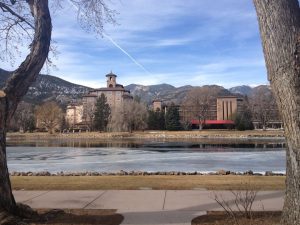
Writing for the Soul 2013 was at The Broadmoor Hotel, a five-star hotel nestled at the foot of the Rocky Mountains. Everything about the conference is first-rate, from speakers to lodging to networking opportunities. Photo by Amy Faircloth.
Last week I attended the Writing for the Soul (WftS) conference in Colorado Springs, Colo. Every year Jerry B. Jenkins and his Christian Writers Guild convene a group of writers, from the very accomplished to beginners. The point is to educate, encourage and empower writers who are also followers of Christ. Experienced authors speak on faith and how to get ahead in the writing world. Others lead workshops and presentations.
Liz Curtis Higgs was one of the speakers. She’s captivating. Full of grace in amazing ways. I initially saw her two years ago, at my first WftS. I was three months pregnant then, and Liz’s talks drove me from belly laughs to flowing tears. I figured hormones caused the emotional seesaw. This year I’m not pregnant. Liz again stirred in me nearly every emotion. I wanted to dash up to her and gush praise. I didn’t. The sappy-groupie method’s not my style. I will, though, write more about her in the future.
On Creation
Liz’s talks, along with others by Steven James, Doc Hensley and Christopher Yuan, reminded me that before I strive to create something–my writing–I should acknowledge that I too was created. Madeleine L’Engle writes about this in Walking on Water: Reflections on Faith and Art. She points to the 1928 Book of Common Prayer, which reads, “Be ye sure that the Lord he is God; it is he that hath made us, and not we ourselves.”
The modern translation of the Book offers this instead: “For the Lord himself has made us and we are his.” L’Engle says the newer translation is true,
But we also need to be reminded in this do-it-yourself age that it is indeed God who has made us and not we ourselves. We are human and humble and of the earth, and we cannot create until we acknowledge our createdness.
Things Left Undone
Another theme of the conference was “Get busy.” Writers are skilled procrastinators. We devise excuses for not writing. Our children are too young, too demanding. The house is dirty. Writing doesn’t pay well. These are real challenges, but they shouldn’t deter us. More than one person at the conference who said the time to write is now. Even if it’s only 20 minutes a day.
Author Steven James urged us to jump into writing with all of who we are, to serve God. Now. God gives writers ideas, and he wants us to chase hard after them. What if, on seeing God, he asks us what we did with the ideas he sent us? As L’Engle says, “It is the things I have left undone which haunt me far more than the things which I have done.”
By working each day, L’Engle says, we enable ourselves to create something bigger and better than ourselves. To let the work take over.
When the work takes over, then the artist is enabled to get out of the way, not to interfere. When the work takes over, then the artist listens. But before he can listen, paradoxically, he must work. Getting out of the way and listening is not something that comes easily, either in art or in prayer. … We must work every day, whether we feel like it or not; otherwise when it comes time to get out of the way and listen to the work, we will not be able to heed it.
An Icon of the True
The second chapter in Walking on Water is titled “Icons of the True.” L’Engle explains that stories can be vehicles of truth; icons, even.
It’s no coincidence that Jesus taught almost entirely by telling stories, simple stories dealing with the stuff of life familiar to the Jews of his day. Stories are able to help us to become more whole, to become Named. And Naming is one of the impulses behind all art; to give a name to the cosmos we see despite all the chaos.
Conferences may also be vehicles of truth. Writing for the Soul helps me become more whole, as a writer and a follower of Christ. The four-day gathering allows me to be “Named.” I come away with a better sense of the world and my place in it. WftS is an icon of the true.
Good recap, and thanks for the photo credit!
Thanks for this rousing encouragement to get to work!! So glad the conference was life-giving for you, and grateful that you’ve shared your excitement with us.
I have found the phenomenon so beautifully articulated by Madeline L’Engle to be true: “when the work takes over, then the artist listens.” I call it Grace. Thank you for adding these inspiring truths to the encouragement we received at Writing For The Soul conference. I loved it too.
The conference sounded so inspiring. I am glad to be reminded of Madeleine L’Engle”s book which I read years ago and now want to peruse once again. 20 minutes a day can keep an artist on course to continue the work. I just need to practice that myself.